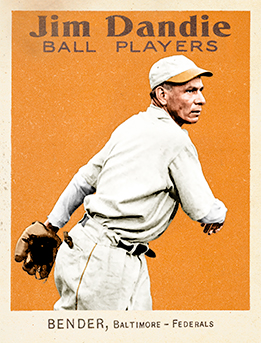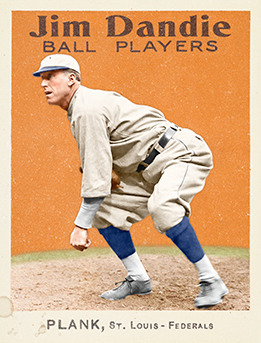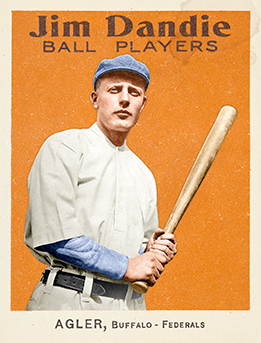
- Series: Jim Dandie Feds
- City: Buffalo
- Team: Blues (FL)
- League: Federal League
Joseph Abram Agler (1887-1971) was a first baseman/outfielder from Coshocton, Ohio who debuted with the Washington Senators at the end of the 1912 season after several years in the minors. He had started out in professional ball with Lansing of the Southern Michigan League in 1907. He then played for Canton, Newark, Atlanta and Jersey City before finally getting a late-season try-out in D.C. His long-awaited opportunity failed to gain Joe a spot on the Senators' 1913 team and he returned to the Atlanta Crackers. He got his big chance at “major league” glory when the Federal League opened for business in 1914.
The Federal League of Base Ball Clubs had incorporated in '13 under the auspices of John T. Powers who dangled the prospect of avoiding the hated reserve clause as an inducement to recruit disgruntled big-leaguers. Dubbed an “outlaw” enterprise by the AL and NL, the experiment was doomed to fail. Nevertheless, players such as Agler benefited by the expanded rosters and short-lived salary surges. He got his opportunity with the Buffalo Buffeds in 1914, playing 135 games and hitting a respectable .272. Dealt to the Baltimore Terrapins in the middle of the 1915 season, Joe improved a bit on the poor average that prompted Buffalo to give up on him. He hit only .178 for the Buffeds but batted .215 for Baltimore. His overall average in his three partial years in the majors was .246, not much below his minor league average of .258 showing modest but steady ability.
- The Federal League may have been a brief actor on the major league stage but it left some indelible marks on the game. The Terrapins caused such a financial crisis for the across-the-street Orioles that the team had a fire sale which included sending a young kid named Ruth to Boston.
- Wrigley Field was built for the Federal's Chicago Whales and still stands as a monument to the brash entrepreneurial spirit that built the national pastime
- Litigation in the wake of the Federal League also sealed the monopoly still enjoyed by MLB as the Supreme Court ultimately ruled it was exempt from the Sherman Antitrust Act
- Series: Jim Dandie Feds
- City: Baltimore
- Team: Terrapins
- League: Federal League
- Hall: National Baseball Hall of Fame
Charles Albert Bender (1884-1954) won 212 games en route to a Hall of Fame career. He began life amid the abject poverty of a Minnesota reservation, was mentored by Pop Warner at the Carlisle Indian School and hit the majors with a bang for the Athletics in 1903. “Albert” as Connie Mack called him, beat future Hall members Cy Young and Clark Griffith compiling 17 wins in his rookie season. He led the league 3x in win percentage but was at his best under pressure. In 5 World Series, Bender won 6 games with a 2.44 ERA and completed 9 of his 10 starts.
- Connie Mack said that of all his players he would most trust Bender to win in the clutch
- Admired for his brilliance, Ty Cobb dubbed him the most intelligent pitcher he ever faced
- Elected to Hall of Fame: 1953
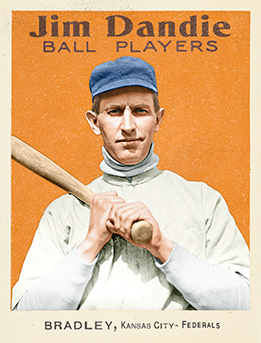
- Series: Jim Dandie Feds
- City: Kansas City
- Team: Packers
- League: Federal League
William Joseph Bradley (1878-1954) played third base better than anyone in the new American League until he was slowed by injury in 1906. Having jumped to the junior circuit from the Chicago Orphans in 1901, Bradley set batting and fielding marks for his hometown Cleveland Blues that would only be eclipsed by the likes of Ty Cobb and Home Run Baker. His pinnacle year came in 1902 when he batted .340, scored 104 runs with 39 doubles and 11 home runs, all putting him in the top five or six in the league. Bradley's output declined markedly following his injury-shortened season in '06. He stayed with Cleveland through the 1910 campaign, still playing regularly but seeing a great drop-off at the plate. He went to the International League's Maple Leafs as player-manager in 1911 but returned to the majors as manager for the Brooklyn Tip-Tops in the new Federal League where he put himself in as an occasional pinch hitter.The team's 77-77 record was good for a fifth-place finish. The next, and last, year for the Federal League saw him with the Kansas City Packers where Bill returned to a back-up role at third, playing in about half the club's games. Though known for his excellent fielding, Bradley figured uncharacteristically in a Cleveland no-hitter in 1908. Bob Rhoads hurled the gem but was shocked when he learned the hit he thought he'd surrendered on a grounder to Bradley had been ruled a rare error. His dazzling play at his position was a throwback to the earlier no-glove era as he mastered a bare-handed scoop-and-toss to throw out attempted bunters, per Stephen Constantelos of SABR. His rival as the best third-sacker of that decade, Jimmy Collins of Boston, told an admiring fan: “Well, if I could field and bat like Bradley, I should lay claim to that title myself.”
- On September 24, 1903 Bradley hit for the cycle in D.C. with 12 total bases
- Bradley's physical issues in 1906 had been presaged by a mysterious illness in '05 when his average began to drop. An intentional inside pitch from NY's Bill Hogg broke Bill's wrist, the first of a series of injuries that would plague him for the rest of his MLB tenure
- Hogg removed any doubt about his intention to disable Bradley when he vowed “The big Frenchman (Nap Lajoie) is next on my list.”
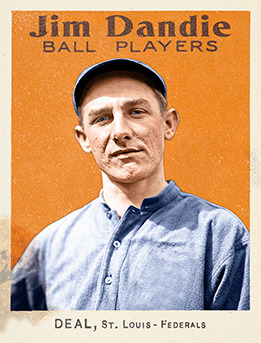
- Series: Jim Dandie Feds
- City: St. Louis
- Team: Terriers
- League: Federal League
Charles Albert Deal (1891-1979) like many of his peers in the early decades of baseball wanted to be fairly compensated for his talents, a concept alien to most of the owners of his day. Not even a spot on the Miracle Braves of 1914 could hold Deal's loyalty when the Federal League offered a chance at better pay. Charlie had played for Detroit in 1912-13 before joining Boston's club during the 1913 season. He was a decent third baseman who must have impressed his new team when he hit .306 late in '12. Unfortunately, although the 1914 Braves had a year for the ages, Charlie hit a mere .210 and saw greener pastures with the St. Louis Terriers in the Federal League's second and final season in '15. The move proved extremely lucrative for Deal. His salary ballooned from $2400 to $4500 plus a $3500 bonus. This may have been emblematic of the financial turmoil the Federals introduced and which led to the demise of such a profligate operation - in the minds of the establishment of the day. After the Terriers folded, Charlie played briefly for the Browns but found a home with the Cubs in 1916. In his tenure in the Windy City, interrupted by wartime obligations, Deal established himself as one of the best third basemen of the day. He never was able to hit much above his .250 norm but stayed with the Cubs through the 1921 season on the strength of his fielding prowess.
- Deal still had a taste for the game after ending his time in the big leagues. He went west and played for the Los Angeles Angels for two years and even played for the Vernon Tigers in 1924 in the industrial heart of South LA.
- Charlie moved up to Portland, still in the PCL, in '25 and wrapped up his professional career with the Southern Association's New Orleans Pelicans in 1926
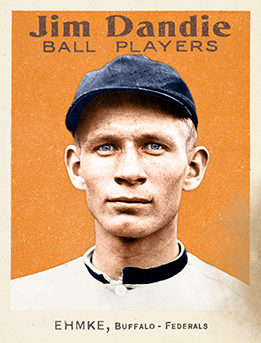
- Series: Jim Dandie Feds
- City: Buffalo
- Team: Blues (FL)
- League: Federal League
Howard Jonathan Ehmke (1894-1959) was a durable pitcher who played fifteen of his sixteen years in pro ball in the majors. The right-hander compiled a 166-166 record, debuting with the Buffalo Blues of the Federal League in 1915 before moving on to a fine career with three of the sport's great teams: the Tigers, Red Sox and Athletics. Ehmke had an unlikely highlight to his long career in 1929's World Series when Connie Mack took him up on his offer to pitch the opening game. Howard had shown flashes of greatness including hurling a no-hitter followed by a one-hitter and had pitched very respectably in '29, going 7-2. Nevertheless, he was a surprise choice to start the series as the veteran's activity had been limited that season. But the savvy Mack knew the opposing Cubs might be vulnerable to a side-arming righty. Ehmke went on to set the record for strikeouts in the post-season with 13, a record that would stand for decades until surpassed by Carl Erskine in 1953, a feat Howard listened to on his car radio until the battery died. He also set a record that held until 2006 for having the fewest regular-season wins by a Series starter.
- Bill James has called Connie Mack's decision to start Ehmke in '29 “the most brilliant managerial stratagem in the history of baseball”
- Playing for Boston in 1923, Ehmke won 20 and threw his no-hitter against Mack's Athletics, followed four days later by a one-hitter versus the Yankees, an effort marred only by a grounder off the third baseman's chest ruled a hit. Things evened out for Howard, however, as his no-no had featured a hit off the wall that became an out when the batter missed first base
- Thanks to his no-no followed by the one-hitter, Ehmke still holds the American League record for fewest hits allowed in back-to-back starts with 1
- Ehmke had a distinguished career as a player but also made his mark with his inventive bent. He sold the Pirates on his idea for a tarpaulin to cover Forbes Field's infield in the event of rain. Howard parlayed that sale into a life-long business marketing all manner of tarps and fabrics, including canvas for the war effort in the forties. The Ehmke Manufacturing Co, based in Philadelphia, continues to this day
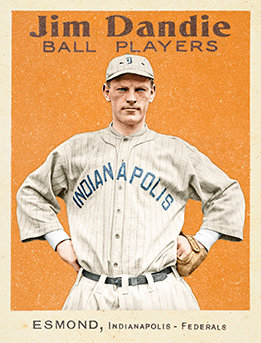
- Series: Jim Dandie Feds
- City: Indianapolis
- Team: Hoosiers (FL)
- League: Federal League
James Joseph Esmond (1889-1948) played shortstop for three major league clubs from 1911-1915, half of his tenure being with two Federal League teams: the Indianapolis Hoosiers and Newark Pepper. Jimmy had started in pro ball with the Gloversville-Johnstown/Elmira nine of the New York State League in 1908, a team with constituents all over the upstate area that would be reconstituted from 1939-51 in the Canadian-American League. Esmond never managed much offensive output in the minors and may have been that rare player to perform better when he got to the Cincinnati Reds in 1911 and hit .273. He reverted to form in '12, taking a demotion to the International League's Montreal team in 1913 before getting a final chance at major league glory in the renegade Federal League. He would be out of baseball for all of his late twenties before reappearing with Syracuse of the IL in 1921 at age 31. He then moved to the Eastern League and played a season each for Waterbury, Albany and Pittsfield. Jimmy's performance in Indiana and New Jersey far exceeded his norm, undoubtedly due to the paucity of truly major league caliber talent as the Feds tried valiantly to compete as a third league. He hit .295 for the Hoosiers with a league-leading 15 triples. Though his batting average subsided with the Peps he hit 11 more three-baggers showing extra-base prowess heretofore not in evidence. Esmond's debut in Newark allowed him to bask in the glow described in the local paper: “Newark and its surrounding hamlets were seized with a violent attack of baseball yesterday, accompanied by a high fever and laryngitis. The ailment can be directly traced to the opening of the Newark Federals at their new, roomy park in Harrison. The epidemic spread among nearly 25,000 Jersey folk who jammed the new park to see 'Whoa Bill' Phillip's 'Peps' make their home debut against Otto Knabe's Baltimore Terrapins.” The celebration was dampened a bit by the Terps' 6-2 victory. Sadly, Jimmy's three errors made it tough for starter Cy Falkenberg.
- Esmond's major league debut in Cincinnati was in the ballpark known as the Palace of the Fans, occupied by the franchise since 1902. In 1912 Jimmy and the Reds got to inaugurate Crosley Field, the team's home until 1970
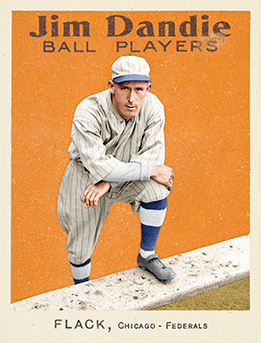
- Series: Jim Dandie Feds
- City: Chicago
- Team: Whales
- League: Federal League
Max John Flack (1890-1975) was a left-handed outfielder who played a dozen seasons in the majors in Chicago and St. Louis. He compiled a career average of .278 with little power but considerable speed, stealing 200 bases over his tenure. In recent years a shadow has been cast over this journeyman's reputation as his status as the “goat” of the 1918 World Series has been looked at in more sinister terms with the uncovering in 2007 of documents pertaining to the Black Sox scandal. An affidavit by Ed Cicotte indicates he and his wayward teammates felt “inspired” by the Cubs' loss to Boston the year before. Flack's dubious performance in the Series made him an object of suspicion. He remains the only player to be picked-off twice in a World Series game. His throwing error in game six provided the margin of victory to Babe Ruth's Sox. However, a review of the box scores for the '18 Series shows the Cubs were charged with six errors and Flack committed only the one that led to Boston's only scores in the finale (in the third inning). There were a number of noteworthy aspects to that Series beyond speculation of misconduct. Due to the war, it became the only Fall Classic to be played entirely in September. The Cubs eschewed their home park (later to be named Wrigley Field) in favor of vaunted Comiskey Park (“The Baseball Palace of the World”). Although it would not be named the national anthem until 1931, game one was graced with the first performance of the Star Spangled Banner at a major league game. And, of course, it would be mourned by Boston fans for another 86 years as the last championship as the Curse of the Bambino took hold. So, if Max did engage in mischief, he did so on a grand stage, but there is nothing but unfortunate circumstance to implicate him.
- Flack had debuted with the Federal League's Chicago “Chi-Feds” (later the Whales) in 1914
- He remained in town with the Cubs following the demise of the upstart league the next year, playing regularly for six seasons before moving to the Cardinals as a reserve for four more
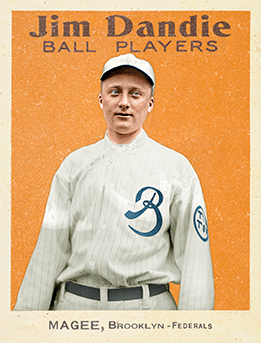
- Series: Jim Dandie Feds
- City: Brooklyn
- Team: Tip-Tops
- League: Federal League
Leo Christopher Magee (1889-1966) started his major league career in dramatic fashion as he and his Cardinal teammates helped rescue dozens of fellow passengers when their train wrecked in Connecticut. His manager Roger Bresnahan liked what he saw despite Magee's weak hitting, putting him in for the injured Miller Huggins at second and then moving him to left where he acquired the nickname “Flash.” Magee finished that 1911 season with a much improved batting average--.290--good for third on the team. Leo was a hothead, encountering numerous run-ins with umpires, squabbling with management over salary and even getting ejected mid-game for fighting—with teammate Ted Cather. Nevertheless, or perhaps because of his fiery style, John McGraw chose Magee as a member of a world-tour exhibition competing with Charles Comiskey's American Leaguers. He showed his flair for the dramatic could work on the field in a match in Medford, OR, when in pouring rain, he glided toward the line in left to make a grab while carrying an umbrella. The teams ended their circumnavigation of the globe aboard the Lusitania after their last games in England in March 1914. He was courted by the new Federal League Chicagos but remained with Mordecai Brown's Terriers for a fine season before finally jumping to the Brooklyn Tri-Tops in '15 where he also became, at 25, one of the youngest managers. He wasted no time demonstrating his temper, getting ejected in the first inning of the home opener. The experiment of trying such a youngster in the pilot's role failed as Lee's tough style alienated his veteran players and fans alike. His skill at bat and afield caused old mate Huggins, now managing the Yankees, to bring Magee aboard for the 1916 season. Huggins termed Lee “the prize of the Federal League collection.” Salary disputes, unsavory associations and union activity all combined to cast a long shadow over Magee's latter years. Finally, in 1919, he was ousted from the game with Hal Chase for allegations of throwing a game.
- Despite a fine career average of .276 in nine seasons, Magee's tenure ended ignominiously due to a jury verdict that proved the precursor to MLB's crusade against gambling which culminated the next year in the Black Sox affair
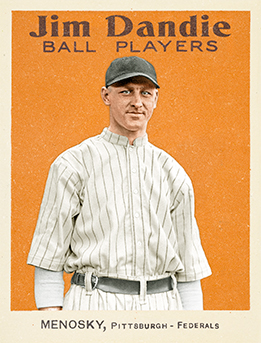
- Series: Jim Dandie Feds
- City: Pittsburgh
- Team: Rebels
- League: Federal League
Michael William Menosky (1894-1983) earned the nickname “Leaping Mike” for his abilities in the outfield and had some fine years at the plate, particularly for the Red Sox, in his nine-year tenure in the majors. He got his chance with the Pittsburgh Rebels of the Federal League in 1914. The team was aptly named, being one of the “outlaw” clubs that vied with the two established circuits for two years. The Rebels had come into the league as the Stogies, the old Union Association team in the Steel City. In its 1912 incarnation, the club was known as the Filipinos, reflecting not a heretofore unknown Asian connection to baseball, but in honor of its manager Deacon Phillippe. Ah, the romance of the early game! Menosky put up very average numbers in Pittsburgh and then with the Senators, a stint interrupted in 1918 by the war in Europe. He came into his own with Boston where he finished his career from 1920-23. His first three years in Fenway saw Mike bat .297/.300/.283 playing as a regular. His final campaign saw a marked drop-off in offense as he slumped to .229 in only 84 games. These seasons in Beantown pumped up his lifetime batting average to a solid .278. Menosky had speed, witnessed by his 10 triples and 22 steals for Washington in 1917 and the 23 stolen bases for Boston in 1920 that ranked fourth in the AL. He was the Sox' regular left fielder his first two seasons and opened in center in 1922, but only played four games there. Boston released the veteran after the '23 season and Mike went west to play for the PCL's Vernon (southeast Los Angeles) team.
- Menosky became a probation officer after leaving baseball. He played an interesting “expert witness” role in a criminal case involving a defendant charged with hurling a rock through a Detroit railroad terminal window. When the judge was skeptical that the man had the arm for that misdeed, he called Mike to demonstrate what a major league outfielder could do. When Menosky failed to throw the missile the 250 feet required to reach the window, the judge dismissed the case, reasoning that if Mike couldn't do it, the poor suspect couldn't have either
- Series: Jim Dandie Feds
- City: St. Louis
- Team: Terriers
- League: Federal League
- Hall: National Baseball Hall of Fame
Edward Stewart Plank (1875-1926) hurled more shutouts and complete games than any other lefthander in his 17-season career. He ranks behind only Warren Spahn and Steve Carlton among southpaws in wins. Signed by Connie Mack straight out of college, Plank never played a day in the minors. Playing in 4 Series for Philadelphia, Plank had an ERA of 1.32 but got no run support, going 2-5 but finishing all six of his starts.
- His 326 wins ranks 13th on the all time list. He had eight 20-win seasons
- At the end of his career, played for St. Louis in the Federal League’s final year in 1915 and then with the Browns for two more
- Elected to Hall of Fame: 1946
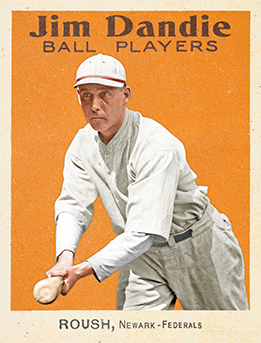
- Series: Jim Dandie Feds
- City: Newark
- Team: Peppers
- League: Federal League
- Hall: National Baseball Hall of Fame
Edd J. Roush (1893-1988) was an Indiana farm boy who knew his own mind. He built a Hall of Fame career on doing things his way. Spring training? Not for Edd, he stayed in shape. Use a bat heavier than any other player? Why not? His farm-bred arm strength allowed him to hit the ball wherever he chose with the weight of the bat doing most of the work. Stand still in the box awaiting the pitch? Not for Edd. He'd move his feet after the ball left the pitcher's hand, positioning himself according to his read. Endure management's miserly ways? No, Edd would hold out every year for a fairer contract. He'd skip to pirate leagues (the Federals) if necessary to find a better salary, something he had done as a school-boy player in Hoosier country and continued throughout his long and storied major league tenure. It took a few years in the bigs and a curious impatience by renowned manager John McGraw to get Edd to Cincinnati and the stage on which he would set records. Twice he edged out Rogers Hornsby for batting titles. He led the Reds to the Series championship in 1919, only to have that accomplishment tarnished by scandal. There is little doubt he was right in asserting that his club was better than Chicago's and really won it fair and square. During his twelve years with the Reds, Roush's batting average was .331. He never struck out more than 25 times in a season. He was fast on the bases and a terror in center, regarded as perhaps the premier defender of the Dead Ball era with Tris Speaker the competition.
- McGraw sent young Edd from the Giants to Cincy in 1916 along with two other future Hall-of-Famers: Bill McKechnie and Christy Mathewson. Matty was tickled to get a manager position and Edd and Bill were thrilled to get out from under the tough taskmaster McGraw
- When Edd threw out the ball at the last game played at Crosley Field, Joe Morgan said Roush was “the best of us all.”
- Elected to Hall of Fame: 1962
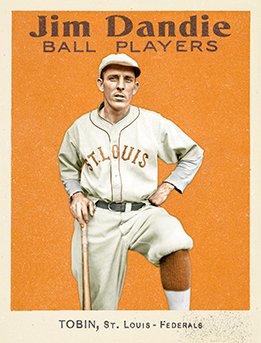
- Series: Jim Dandie Feds
- City: St. Louis
- Team: Terriers
- League: Federal League
John Thomas Tobin (1892-1969) built a fine major league career in the outfield for four teams, primarily in his hometown of St. Louis with the Federal League's Terriers in that organization's two years competing with the AL and NL, 1914-15; then staying on with the Browns for nine campaigns. “Johnny” did himself proud with the Browns, compiling a .318 average. Over his tenure in the big leagues, his average was an excellent .309. Tobin's introduction to the big leagues came via his play for his employer, Bell Telephone. He was literally recruited by the Terriers from atop a pole. He quickly established himself in St. Louis as a popular guy, both with fans and writers. Johnny led his team of MLB castoffs from last in '14 to within an eyelash of the Federal League pennant in '15, earning him a spot on the Browns. Business Manager Branch Rickey thought Tobin needed some seasoning and shipped him to the Salt Lake City Bees for most of 1917, a move that bore the mark of Rickey's genius as Tobin tore up the Coast League, leading the circuit with 265 hits. He would go on to earn the plaudits of no less than teammate George Sisler who termed him “One of the best leadoff men I ever saw” and “the best drag-bunter anyone ever saw.” The crafty speedster began piling up great seasons in St. Louis. He hit .322 in '22 when the club fell just shy of the Yankees, the only team they couldn't beat. Eventually Tobin's speed faded a bit and he was traded to the Senators in 1926 where he played very little before moving on that season to the Red Sox. His finale in '27 was a fitting resurgence by a great hitter as Tobin hit .310 in 111 games.
- Walter Johnson was another fan: “Tobin is a batter of the old school, not unlike Willie Keeler in many respects. I am glad there are not more like him.”
- Johnny became a fixture in his hometown's baseball circles, coaching youth and semi-pro leagues. In 1958 the Baseball Writers Association of America named him to the St. Louis “All-Time All-Star” squad along with such luminaries as Musial, Sisler, Frisch, Hornsby and Dizzy Dean

